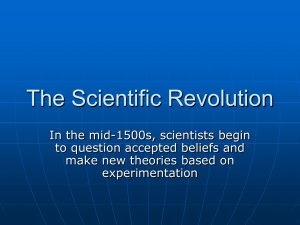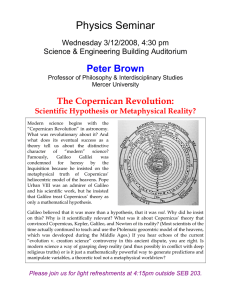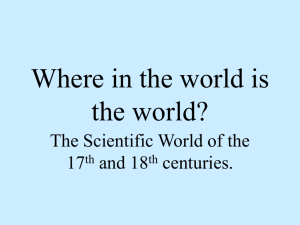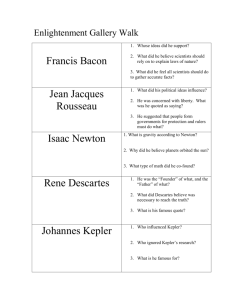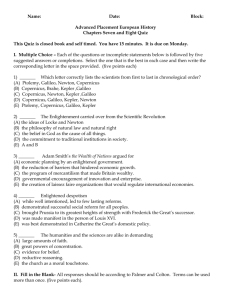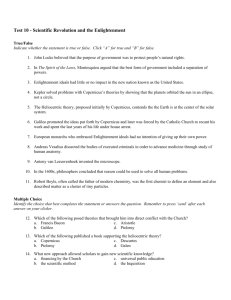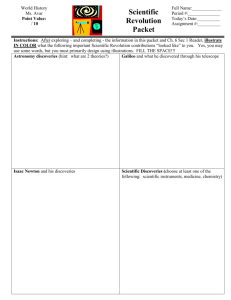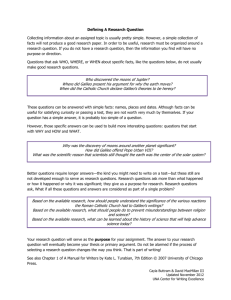The Scientific Revolution
advertisement
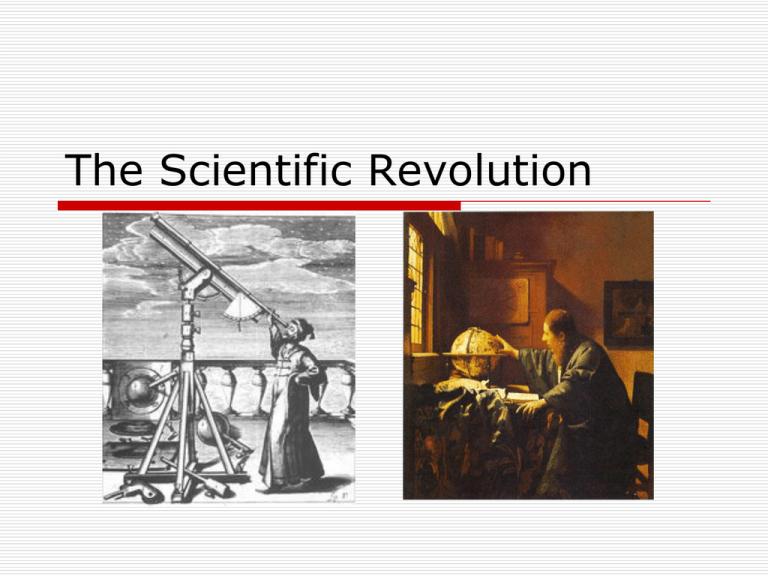
The Scientific Revolution 1300-1600: Renaissance Reformation Scientific Rev. Scientists = uncover the questions of universe thru experiments & math Prior reasoning = GOD & spirits Nothing was an accident This faded I. Experiments & Mathematics Early ideas of universe = ancient Greeks & Romans Humanists discovered contradictions Began to make other observations Early 1500s: began to experiment Described nature w/out reference to previous beliefs Principle of Doubt Scientific Rev. (1500s – 1600s) Scientists had access to new instruments Barometer, microscope, thermometer Scientific Method (logical procedure for gathering & testing ideas) Problem or question Hypothesis Tests/experiments Analysis to reach conclusion II. Astronomy, Physics, & Anatomy A. Copernicus Earth = center of the universe? All celestial bodies moved in perfect circular paths around Earth? Common sense supported this, right? Also, God placed Earth at the center? Originated w/Aristotle (4th cent. BCE), and expanded by Ptolemy (2nd cent. CE) “Geocentric Theory” (Ptolemy) Nicolaus Copernicus developed the “Heliocentric Theory” 1543: published findings (On the Revolutions of the Heavenly Bodies) Few accepted it – he could not test/prove theory B. Kepler & Galileo Johannes Kepler: used math to test Heliocentric Theory Calculated the problem many times Orbits = NOT exact circles, they were ellipses Only mathematicians understood until… Galileo Galilei discovered concrete evidence 1609: created a telescope to see heavens Details of moon Sunspots Discovered moons orbiting around Jupiter (disproved Geocentric Theory of Ptolemy) 1610: published Starry Messenger Galileo’s findings frightened Church leaders 1616: Church warned Galileo 1632: published Dialogue Concerning the Two Chief World Systems Galileo supported Heliocentric Theory 1633: Pope summoned Galileo to Rome Inquisition – he renounced ideas of Copernicus With sincere heart & unpretended faith I abjure, curse, and detest the aforesaid errors & heresies [of Copernicus] & also every other error contrary to the Holy Church, & I swear that in the future I will never again say or assert…anything that might cause a similar suspicion toward me. --Yet the earth does move. Galileo was never again a free man 1992: Catholic Church acknowledged Galileo was right C. Bacon & Descartes Rene Descartes—Fr. Philosopher & scientist One should question all assumptions Discourse on Method (1637) –everything had to be proved except basic ideas EX: b/c he could think proved his existence I think, therefore I am. “Father of Modern Philosophy” Also, a great mathematician: Created the Cartesian coordinate system “Father of Analytical Geometry” Francis Bacon—English philosopher Urged scientists to experiment & then draw conclusions Empiricism (experimental method) D. Newton Isaac Newton—developed theory of motion Published Mathematical Principles of Natural Philosophy Laws of motion & gravitation (explained movements of objects on earth as well as other planets) Nature & Nature’s laws lay hid in night; God said, ‘Let Newton be!,’ and all was light. --Alexander Pope E. Scientific Instruments Zacharias Janssen—microscope Anton van Leeuwenhoek—discovered bacteria Robert Hooke—discovered cells Evangelista Torricelli—developed barometer Gabriel Fahrenheit—first thermometer (32°) Anders Celsius—different scale (0°) Joseph Priestly—discovered oxygen Elements = fundamental substances that make up matter Antoine Lavoisier—fire is NOT an element Also: matter is indestructable F. Medicine & the Human Body Andreas Vesalius—dissected corpses On the Structure of the Human Body Details of human organs, bones, muscle Edward Jenner—introduced vaccine to prevent smallpox (cowpox) G. Discoveries in Chemistry Robert Boyle—founder of modern chemistry The Sceptical Chymist (1661) Aristotle = world is made up of four elements? NO, it’s made up of many smaller particles Boyle’s Law = explains how volume, temp., & pressure of gas affect each other
